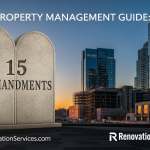Strategic Property Management in New York: Maximizing Value and Efficiency
1. Understanding Property Management Systems
Property management in New York’s complex and competitive market involves a systematic approach. Property managers must decide whether to handle tasks in-house or outsource them. This decision impacts the scale and cost of their operations. In-house management provides greater control but can be more expensive, especially for properties spread across different locations.
Insight: Using a well-integrated property management system can streamline processes, such as rent collection and tenant communications, improving overall efficiency.
Property owners must also consider long-term integration of their management software with accounting and maintenance systems. For guidance, check out resources at HUD.gov for best practices in property management.
2. Strategic Use of Technology
New York properties, particularly in boroughs like Brooklyn and Queens, benefit significantly from adopting modern technology. Systems that automate billing, lease management, and maintenance requests save time and reduce errors. These platforms often feature analytics that help managers make data-driven decisions.
Data Insight: Automated maintenance scheduling can reduce operational costs by up to 20% and improve tenant satisfaction through faster issue resolution.
Implementing these technologies can also assist in planning for rent reviews and lease renewals, crucial for maximizing rental income. For landlords considering tech upgrades, contact Renovation Services for solutions that fit your property’s needs.
3. Balancing In-House and Outsourced Management
Deciding between in-house or outsourced property management services requires a comprehensive cost-benefit analysis. While in-house teams offer greater flexibility and familiarity with properties, outsourcing can be more economical for extensive portfolios or geographically dispersed properties. Areas like Staten Island and Nassau County present different logistical challenges that may affect this decision.
Tip: Analyze the geographical distribution of your properties to determine the most cost-effective management approach.
For example, managing a single building in Manhattan may differ vastly from overseeing multiple properties across Long Island. Considering these factors can save property owners significant costs and improve tenant relations.
Top 15 Tips for Property Management Success in NYC
4. The Role of Data Analytics in Property Management
Data analytics have become indispensable in modern property management. By analyzing tenant behavior, rental trends, and maintenance logs, managers can optimize their strategies. For instance, in high-demand areas like the Upper West Side, understanding peak rental seasons can help in planning lease renewals more strategically.
Example: Using data to track maintenance requests can reveal patterns, such as recurring HVAC issues, allowing for preventative maintenance and cost savings.
These insights also aid in budgeting and forecasting, making operations more efficient and profitable. Tools like rent forecasting models and tenant satisfaction surveys can significantly enhance a property’s value and desirability.
Extended FAQs on Property Management in New York
Q1: What are the main benefits of using property management software?
A: Software streamlines operations, reduces human error, and provides valuable data for strategic decision-making.
Q2: How can property owners in Long Island attract family tenants?
A: Focus on school district quality, family-friendly amenities like playgrounds, and neighborhood safety.
Q3: What is the impact of NYC’s rent stabilization laws?
A: Rent stabilization limits the rent increases landlords can impose, which affects revenue strategies but provides stability in tenant turnover.
Q4: Can green upgrades really boost property value?
A: Yes, energy-efficient buildings attract eco-conscious tenants and can qualify for government incentives, reducing long-term costs.
Q5: What should a property manager include in a disaster response plan?
A: A comprehensive disaster response plan should include evacuation routes, emergency contacts, a list of critical service providers, procedures for tenant communication, and plans for securing the property from further damage.
Q6: How do I handle difficult tenants without escalating conflicts?
A: Use clear, documented communication and enforce lease terms consistently. Mediation services can also help resolve disputes amicably.
Q7: How frequently should I update my rental rates?
A: Conduct a market analysis annually or when leases are up for renewal. Stay competitive but ensure rental increases are in line with legal constraints, especially in regulated areas.
Q8: Are there benefits to allowing pets in rental properties?
A: Yes, allowing pets can broaden your tenant pool. However, be sure to set clear pet policies and consider charging a pet deposit or monthly pet fee to cover potential damages.
Q9: What amenities are most in-demand among NYC tenants?
A: High-speed internet, smart home features, in-building laundry facilities, fitness centers, and secure package delivery systems are increasingly popular.
Q10: How do property managers stay compliant with New York City regulations?
A: Stay updated by regularly checking the NYC Department of Buildings website and attending property management workshops or training sessions. Compliance software can also automate regulatory checks.
5. Maintenance Strategies for Maximum Property Value
Regular maintenance not only ensures tenant satisfaction but also preserves the long-term value of your property. In a city like New York, where building codes and standards are stringent, proactive maintenance is essential. Develop a detailed maintenance schedule covering everything from HVAC servicing to fire safety checks.
Important Note: New York City’s Local Law 11 mandates periodic inspections of building facades for safety. Non-compliance can result in hefty fines.
Additionally, consider seasonal maintenance routines. For instance, winter in NYC can be harsh, so make sure heating systems are efficient and sidewalks are salted to prevent tenant accidents. A proactive approach can also include offering energy audits to tenants, helping them reduce utility costs and promoting sustainability.
6. Financial Management and Budgeting
Effective financial management is crucial for any successful property management strategy. From tracking rental income to managing property taxes, having a clear budget can help you anticipate expenses and allocate funds wisely. New York property managers often face fluctuating costs, especially with utilities and emergency repairs.
Tip: Set aside 10-20% of your annual budget for unexpected repairs or regulatory compliance updates. This financial cushion can protect your bottom line.
Also, consider implementing a rent escalation clause in leases to account for inflation and rising property costs. This can help maintain profitability without surprising tenants with sudden, steep rent increases.
Best Practices for Communication and Tenant Relations
7. Building Strong Tenant Relationships
Tenant satisfaction is a top priority for successful property management. Happy tenants are more likely to renew leases, reducing turnover costs and vacancy rates. Make it easy for tenants to communicate by providing multiple contact methods, from email to mobile apps. Hosting community events can also strengthen the sense of community and make tenants feel more connected to their living environment.
Community Tip: Organize seasonal events, like summer barbecues or holiday parties, to foster tenant camaraderie and promote long-term residency.
Transparency in communication is also key. Keep tenants informed about any building maintenance, policy changes, or neighborhood updates. Providing a quarterly newsletter can be an effective way to maintain open lines of communication.
8. Legal Considerations for Property Managers
Understanding and adhering to local laws is non-negotiable for property managers in New York. This includes rent control regulations, eviction procedures, and tenant rights. Be sure to document everything, from lease agreements to tenant complaints, to protect yourself legally.
Legal Resource: Visit the NYC Tenant Resource Portal for detailed information on landlord-tenant laws and updates on city housing regulations.
Moreover, consider hiring a legal consultant to review your lease agreements annually and ensure they comply with any new laws. Staying compliant not only protects your business but also enhances your reputation as a responsible property manager.
Extra Tips for Mastering Property Management






